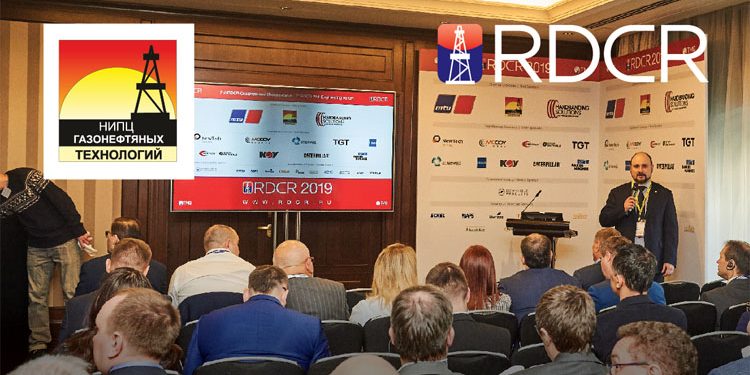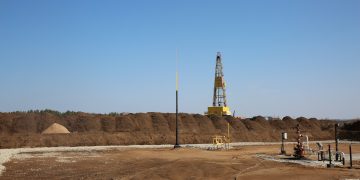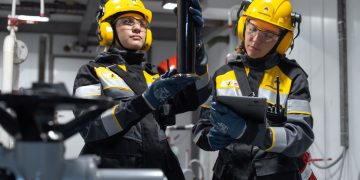New to RDCR-2019 Supervision Services Hall “Supervision in Drilling and Oil&Gas Production”
For the first time at the RDCR-2019 Roundtable, a Hall focused on “Supervision in Drilling and Oil&Gas Production” was organized where the actual issues of supervision development were discussed in open dialogue between supervision companies and the representatives of oil and gas companies. The supervision of drilling and oil and gas production, which has seen an ever increasing importance within the region, has separated into a separate sector which has seen huge recent developments. Practically all of the Russian petroleum companies employ this managerial tool in drilling, well workover, seismic surveys. The significance and responsibility of supervision have considerably grown since the professional standard “Drilling Supervisor in the Oil and Gas Industry” was introduced by the RF Ministry of Labor and Social Protection on November 27th, 2014, and the majority of oil companies have experience the transition to contracting drilling services on a daily-
rate service basis.
However, there does exist different views on the development of supervision services (for instance, is it better to develop the “internal” or “external” supervision services?), the requirements for qualification and level of training of field supervisors which can vary from company to company, and up to now, there is no unity among oil companies and supervision contractors in understanding of the role of supervision and the evaluation of its efficiency – so a clear procedure of introducing innovations into this type of services is missing. Taking into account the importance of the issues and contradictions that are now arising now, the topic of supervision was organized into a separate Hall of “Supervision in Drilling and Oil&Gas Production” this year, which was organized by the “R&D Center for Gas&Oil Tech”, JSC.
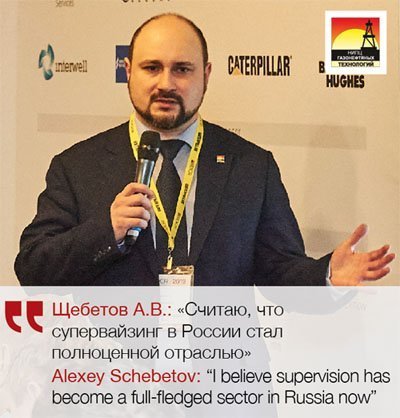
The agenda of the Hall was developed in compliance with the present challenges of the industry and the urgency of issues, and it was divided into three key topic sessions. For example, the first session “The Current Status of Supervision in RF” discussed the experiences of the Russian oil and gas companies and focused on the establishment of their internal services of supervision. The second session, “Innovations in Supervision” was devoted to various methods of enhancing the efficiency of supervision due to the introduction of advanced technologies and digitalization. The third session “International Supervision” had the discussions of our foreign colleagues sharing their experience and vision of the role of supervision in drilling.
The Hall agenda was opened by its moderator, General Director of “R&D Center for Gas&Oil Tech” JSC, Alexey Schebetov in his keynote speech “The Modern Trends in the Development of Supervision”. According to the speaker, the supervision market has already shaped up in RF: circa 40 supervision companies are now working in RF, the market volume has reached over 4 bln. rubles per year, and the number of supervisors stands at over 2.500 specialists now.
Following the review of the supervision market in Russia, of its major players, of the scope of jobs and principles of operation, the speaker dwelled upon the modern trend of the managerial supervision which emerged as a result of a transition from the regional oil and gas companies, moving their contracting system to be based on “daily-rate services”. As a consequence, the requirements to qualification and competencies of a field supervisor have changed; the development of education and training system for supervisors is demanded now, as well as the introduction of innovation technologies.
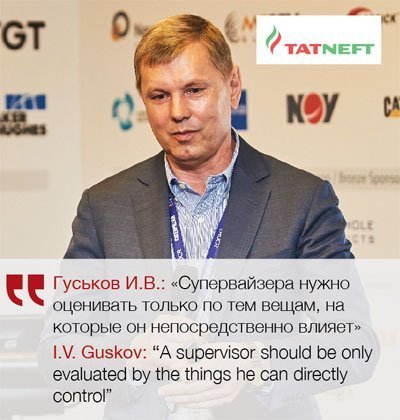
Discussions in the first session were then continued by Igor Guskov, the Head of Supervision Department at “Tatneft”, PJSC, with his report “Development of the Supervision Services for the Well Construction Department Based on the Principle of Daily-Rate”. The central theme of his address was the experience of establishing and development of the supervision services for the Well Construction Department within “Tatneft”, PJSC, on the basis of the principle of daily-rate services, beginning from the structure of supervision services and ending with standardization of supervisor’s job. A considerable overview into the successful supervision activities within “Tatneft”, PJSC – which as succeeded through the strategy of interaction with contractors, based on the principle of long-term cooperation. The company motivates and encourages its Contractors. Only in this way, according to the speaker, it is possible to achieve the best well production, employing separated services. As a separate issue, the speaker dwelled upon the issues of evaluating the efficiency of supervisors’ work and training.
To conclude session one discussions, the next speaker was Ruslan Yagofarov, Senior Manager of the Supervision Support and Auditing Department of “Rosneft”, PJSC, with his report “Development of Drilling Supervision in “Rosneft”, PJSC”. Illustrating the pattern of growth in drilling operations at “Rosneft”, PJSC, the speaker focused on the statement that it’s not only technologies that should be developed to maintain successful drilling but supervisors as well. Further on the speaker presented the basic position of the Company’s own supervision services development strategy with the company set to increase the share of its own supervision services up to 75% by the year of 2022. With this view in mind, the corporate standard for supervision services was created, to ensure supervision support and auditing, and a procedure for employing and maintaining supervisors, based on the evaluation of their competencies in the field of HSE and engineering knowledge. A program for training of young engineering personnel has been implemented.
Concluding his report, Ruslan demonstrated the report of an auditor of one of the Company’s subsidiaries with the evaluation of both supervisors and the entire system of supervision services as well. The evaluation of the field personnel was based on the 7 core competencies where the major one was the skill of managing a contractor under the system of separated services.
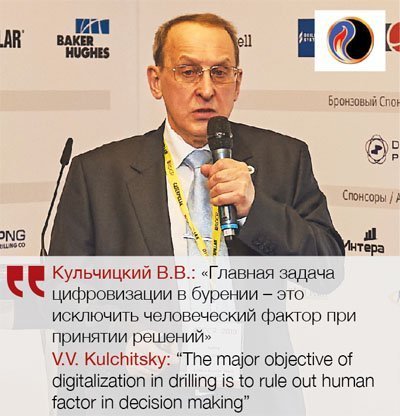
The second session of Hall 4, was opened with the discussions focused on innovations within supervising. Professor of the Gubkin State University of Oil and Gas, Valery Kulchitsky presented his vision of the continued development of supervision services in his report “The Managerial Geo-Supervision as Innovative Technologies in Production, Education and Science”. It is the Geo-Supervision as a combination of mud-logging and drilling supervision in the process of drilling wells, that takes its synergistic effect. Direct access of the drilling supervisor to the raw data results in reduced decision-making time, revealed hidden non-productive time, and reduced time for the drawing up of reports. A mud-logging team and drilling supervisor actually form a solid administrative team. Geo-Supervision is supposed to integrate all of the information streams, all the information services at a drilling site.
According to the professor, the first stage of the transformation of supervision into Geo-Supervision will be the transition by all contractors onto a common platform for the exchange of information streams at a drilling site. The next stage shall be the digitalization of drilling mud system. And lastly, the final stage is the digitalization of controlled directional drilling.
The following presentation titled the “Development and Implementation of a Set of Technologies of Digital Supervision for the Current Well Servicing and Workovers (WSWO)” was presented by Artem Parkhomenko, Deputy General Director of “R&D Center for Gas&Oil Tech”, JSC, where he spoke about the positive experience of the introduction of supervision at “Lukoil – West Siberia”, LLC. A standard vehicle for the WSWO supervisor was equipped with a fluid injection monitoring unit (SKUTP-1) which made it possible to measure, record and perform online transmission of the parameters of the mud inside a delivery line injected into a well: the data of pressure, temperature, density and consumption rate. Synergistic effect was achieved as a result of such combination of the operations of drilling supervision and surface logging: Supervisor’s directives to resolve technical violations discovered in Contractor’s performance were given to Contractor, agreed with Customer and controlled immediately. In addition, success was achieved by preventing any misrepresentation and fraudulent reporting by the WSWO service contractor. Over short time, due to implementation of the concept of geo-supervision, it was made possible to achieve significant improvement in the quality of WSWO operations.
The topic of innovations in supervision was continued within the presentation titled The Enhancement of Efficiency in Operations at “Slavneft-Megionneftegas”, JSC, with the Use of Supervisors Based on “Technical Limit”, where its author, Alexey Poshekhonov, General Director of Global Performance Improvement, shared with the audience a positive experience and outstanding results from the introduction of the “Technical Limit managerial tools.”
According to the speaker, the essence of “Technical Limit” is in the correct organization of labor, which enables personnel to achieve outstanding results. The mnemonic model of “5P” was taken as a basis i.e. “Planning together”, “Executing the job”, “Continuously Measuring”, “Understanding the dynamics”, “Making decision”. Each element has its own set of managerial tools, such as kick-off meetings, Drill Well on Paper (DWOP), flow diagrams, net graphs, and so on. A central place in the “Technical Limit” is occupied by the system of key performance indicators (KPI) based on which each field supervisor is evaluated.
At the end of his presentation, A.N.Peshekhonov has separately pointed out the necessity for supervisors to develop three basic skills: the managerial, communicative and personal skill.
The Third Session, Hall 4: “International Supervision”
Representatives of supervision services from some key foreign companies spoke during this session, as well as some invited experts from abroad. The best international practices within supervision services, with a focus on drilling was presented by invited expert, Kirill Bogachev, who has 8 years’ experience as supervisor within drilling and well completion, on the offshore drilling platform from the “Sakhalin-2” project. The speaker’s presentation titled “The Western Supervision System at the Russian Offshore” included going back to review the history of offshore supervision, the training systems and requirements to offshore supervisors abroad.
As a separate issue, the speaker dwelled on the difference between the western and Russian specialists. First of all, this is a sense of responsibility, when a supervisor, reared up in the western value system, realizes the responsibility for the efficiency of contractor’s work, for the budget, plan and the life and health of the whole of the crew. Being a representative of the Customer, he is interested in continued work of a well for the coming 20 years, rather than looking at some short-term objectives and goals. A western specialist, in a key difference from his Russian colleague, walks a long career path of dozens of years, before he becomes an actual supervisor.
A unique system of training for supervisors in the Shell company was presented in the report titled “How Shell Wells Group Would Mobilize the Skills of its Personnel by Means of a Unique Program of Technical Competence and EIA for its Supervisors” which was presented by the Head of the Drilling Department, Antoine D’Amour. According to him, the Shell Company carries out 90% of its operations on the basis of the principle of separated services. Considerable experience has been accumulated over 30 to 40 years of drilling management. In particular, the Company allocated its supervisors into a separate category of the personnel specialists and elaborated a special long-term training program for them. First of all, all the new supervisors undergo the same thorough technical training, as drilling engineers usually do. After that, the training is enriched with commercial disciplines, as a supervisor is supposed to have knowledge in contracts and finances and with leaders’ training program in industrial safety. And it’s only after a candidate for supervisors proves that he is capable of self-standing management of his drilling crew, he is qualified for supervisors.
In conclusion, the speaker dwelled upon the importance of the Shell supervisors’ leadership in the field of HSE. The Company expects its supervisors to spend only 20 to 25% of their time for control and maintenance of drilling operations, while the rest of their time they would devote to the proper culture of HSE at drilling sites.
The topic of foreign supervision was continued by the Hall’s special guest, John Mitchell (USA). John gained industry wide fame after authoring his book, a bestseller in practical leadership, called: “Accident-Free Drilling” which has been translated into many languages, including Russian. In the 2000’s, John ran many training refresher courses for specialists in Russian oil and gas companies. He knows first-hand the problems of this industry. Lately, John has been involved in training of field supervisors and all of his practical experience he classified in his recently published book “Leadership at Drilling Site”.
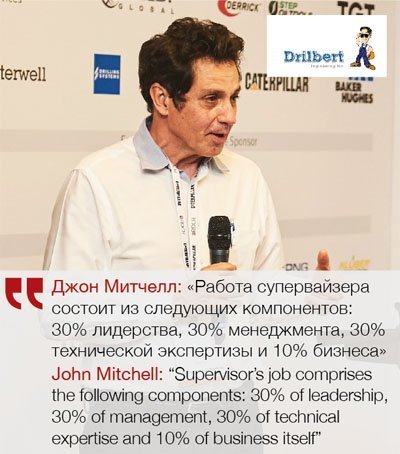
John started his presentation titled “Successful Drilling Supervision” with an important rhetorical question: “What is the role of supervisor?” Is he an “exploiter of slaves” or “helpless observer”? What lies in the essence of the definition of supervisor’s role? A supervisor should combine a number of roles, as an individual person: a leader, a communicator, a coordinator, a problem solver, a decision-making boss, a coach, a mentor, a teacher, and, lastly, a businessman. Supervisor is a person who ensures that everything goes on track, he is acts as a link between office and field, and he extends capabilities of his crew by supervising people who work there. As a leader, supervisor persuade people to do the right things, as a manager, he ensures that they do things right, and as a businessman, he cares about the Company’s interests: its assets, profit, and reputation.
Concluding his report, John provided an expert evaluation of the problem faced by the supervision industry in Russia. In particular, the transition to separated services needs serious investments into the training of high quality supervisors. As before, a Customer considers a contract as a weapon against contractors, which contradicts to the “win-win” strategy and the teamwork methods.
A roundtable of contractors on the issues of supervision was held after the keynote presentations finished, with the purpose of discussing pressing industry challenges of the and to find possible solutions, as well as to build an effective dialogue with oil and gas companies. All participants within Hall 4 were divided into groups, each having a specific topic to discuss and consider. As a result of group discussion and brain storming sessions, each team presented its jointly elaborated solutions.
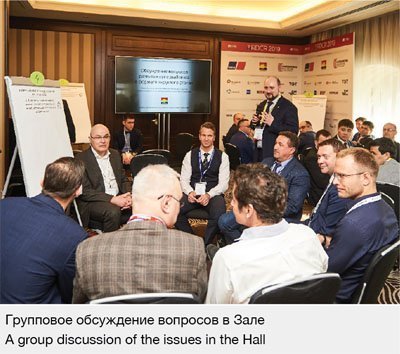
Question: “How do you estimate the existing system of training and education of supervisors?”
Practically all of the participants from the groups highlighted that the current state of supervisors’ training remains on a low level. Often, people are not taught not the skills that they would make use of at a drilling site, but instead, formal things just for the sake of obtaining certificates. There is little use of modern educational techniques, such as virtual reality, online courses and simulators. As a way out of this, it was suggested to sort out candidates for training, selecting those who really want to learn. It is desirable to hire candidates with length of service in the oil services of above 2 years, and carry out training for supervision for candidates with not less than one-year oil industry experience. In this training, emphasis should be placed on the development of the leadership and managerial skills, competencies in technology and industrial safety. As for the question “who should teach supervisors?” the opinions split. Part of the team assumed that supervisors should be trained by supervision companies in their offices, the other part advocated the cooperation with high schools.
Question: “What kind of best practices of supervisors’ evaluation do we already have in our industry?”
The team’s representatives pointed out that the criteria of supervisor’s evaluation should be tangible and measurable. As acting practices, the efficiency evaluation based on the “Technical Limit” program and supervisor’s self-esteem check list, were mentioned. Other criteria for the evaluation of supervisor’s efficiency could include meeting well construction network work timetables, absence of stopping points during inspections, reduction of non-productive time and mitigation of accidents and incidents. As a separate point, the team marked such quality of a supervisor to stress resistance to be significant, therefore the absence of conflicts at drilling site should be evaluated as well.
Question: “What are the specifics of modern requirements for the qualification of supervisors?”
The team pointed out that the major qualification requirement now is the ability to organize and manage the drilling process. Computer literacy is significant too as a supervisor is a user of specialized software for formation of reporting and performing technological calculations. An issue was raised regarding non-compliance of contractual requirements to supervisors with actual labor market. Solution of this contradiction was viewed by the team in concrete description of the base requirements to supervisors, while the rest of specific requirements (such as communication skills, etc) shall be examined during personal interview and testing.
Question: “How successful, within your mind, has the dialogue been between oil companies and supervision service contractors?”
The team opened its work with a survey, asking its participants to evaluate the current situation on a scale from 1 to 10. The overall outcome showed low evaluation of the interaction between oil companies and supervision contractors. To resolve this situation, the team suggested the following solutions: conclusion of long-term contracts, reduction of contract payment terms, price indexation, advance payments and development of the system of motivation, as well as joint team building projects.
Question: “Introduction of which innovation/technologies could help the development of supervision services?”
The team suggested a number of innovations that could free supervisor from many routine functions and equip him with some tools supporting decision making. These include setup of supervisor’s automated work space, as well as support in decision making provided by remote connection to engineering office.
As a whole, one can conclude that the first in-depth – industry wide dialogue on supervision services within Russia has successfully taken place at RDCR. With key roles being played by the RDCR event organizers, TMG Worldwide and the Research and Development Center for Gas and Oil Technologies (R&D Center for Gas&Oil Tech) – alongside the delegates themselves who actively participated in the discussions and exchanged useful information and experience.
We’d specially like to mark the unique atmosphere of involvement and mutual respect which prevailed during the entire days discussions, with the Hall “Supervision in Drilling and Oil&Gas Production”.
Author: Alexey Schebetov, General Director, The Research and Design Center for Gas and Oil Technologies (“R&D Center for Gas&Oil Tech”, JSC)

